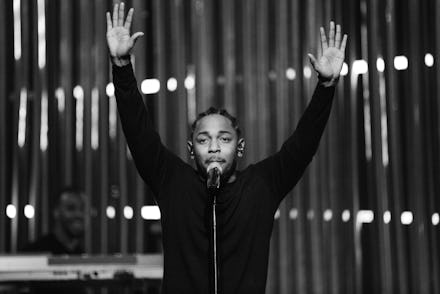Kendrick Lamar Best Exemplified What Music in 2015 Was: Intimate, Personal and Painful

This year America added another protest anthem to its canon. During protests in Chicago, Cleveland and Minneapolis this year, one could hear the chorus of Kendrick Lamar's "Alright" blending seamlessly into the chants of the day: "No justice/ No peace/ No racist police."
Lamar's To Pimp a Butterfly floored the world when it dropped in March. The dense wordplay set over frenetic jazz and stylish funk sent listeners scrambling to explain the deeper meanings and critique at play. It broke a Spotify record; it helped Lamar knock Taylor Swift off the Billboard artist 100 list. The moment of dominance didn't last, but the coup seemed to suggest alternatives to what a popular record could be — something with a higher tolerance for musical complexity and discussions that can't be wrapped up with a neat little maxim like shake it off.
The stories Lamar tells are personal to the point of being painful at times. He raps about his struggles with depression and political despair. He describes racism's centuries-deep corruption he feels powerless to break but compelled to combat, to his own psychological and physical detriment.
The biggest albums of the year all shared this personal, confessional quality. Justin Bieber's Purpose covered his attempts to grow out of his tumultuous hooligan years; Adele's 25 captured her self-doubt and process coming to terms with her flaws. To Pimp a Butterfly covered these topics, but did so with an urgency and a frightening humanity no other music this year could match.
Some of the most telling moments in the album comes in its opener, "Wesley's Theory?" That first hook: "At first I did love you," Lamar sings, reciting a heartbroken valentine directed at the rap game. "But now I just wanna fuck." He describes that toxic relationship: "Bridges burned, lessons learned/ Destroyed." Then, he asks, "What for?"
The hook offers a glimpse at the album's pathos, and that two-word question becomes To Pimp a Butterfly's obsession. Lamar grapples with Lucifer, God and even the almighty Tupac looking for answers. Most of the time, Lamar's lyrics sow more chaos than they provide answers. In this way, To Pimp a Butterfly is the complete converse of the conscious rap of the '90s, oft characterized by and maligned for its didacticism.
To Pimp a Butterfly does something more important than provide answers, though. It offers a glimpse into how agonizing it is to be a survivor in America — more specifically a black survivor, living in a society that glorifies black culture and devalues black life.
The album plays out like an uncomfortable, high-stakes psychotherapy session. That voyeuristic thrill fades quickly when one begins to realize how much is at stake in the topics he chooses to discuss.
Lamar weaves stories covering history of black oppression and emasculation with modern chronicles of police brutality. The yams he boasts about on "King Kunta" — a historically literary symbol for authenticity and power — cannot protect him from the state-sanctioned violence Lamar comes face to face with on "The Blacker the Berry." Even here, discussing generations of violence-institutionalized racism, he begins each verse calling himself "the biggest hypocrite of 2016" for trying to speak on black death having propagated it himself. More than invalidating his words, however, the confession further illuminates how disturbingly complex the moral decisions facing humans day to day can actually be.
The personal trauma always comes through on almost every song. On "u" — perhaps the most difficult track to stomach — Lamar talks about his little sister getting pregnant as a teenager while he was off touring the world. He contemplates suicide between pulls from a liquor bottle. "Where was your antennas, where was the influence you speak of?" Lamar yells at himself, as if looking in a mirror. "You preached in front of 100,000 but never reached her/ I fuckin' tell you, you fuckin' failure — you ain't no leader!"
The album does have its hopeful moments. The confessional "u" has its uplifting counterpart "i," with its soulful hook, "I love myself." It should serve as what would be the traditional epiphanic moment in the hero's journey. However, the single version of "i" with its sunny, radio-ready disposition made Lamar's core hip-hop audience highly skeptical when it dropped in September 2014. That version never actually made the album.
The "i" that appears has been recorded to make it seem like a live performance, and a fight interrupts it halfway through, before Lamar can deliver his full message of self-love. He replaces it with a poem arguing rappers should be using the word "negus" rather than "nigga," to stay closer to the original Ethiopian word used to describe "royalty." Yet in interviews he's said he's not nearly ready to start using the word himself.
Nothing on the album is straightforward. Life is not pretty, people are not simple and To Pimp a Butterfly is neither of those things. No other album came closer to expressing these fundamental truth. Lamar was not kidding when he teased the album in a Rolling Stone interview and said it would be taught in "college courses." Listening through does feel like parsing an epic akin to the Invisible Man or Moby Dick. As overwhelming as that may be at times, its power is undeniable.
Read all of Mic's year-in-review coverage here.